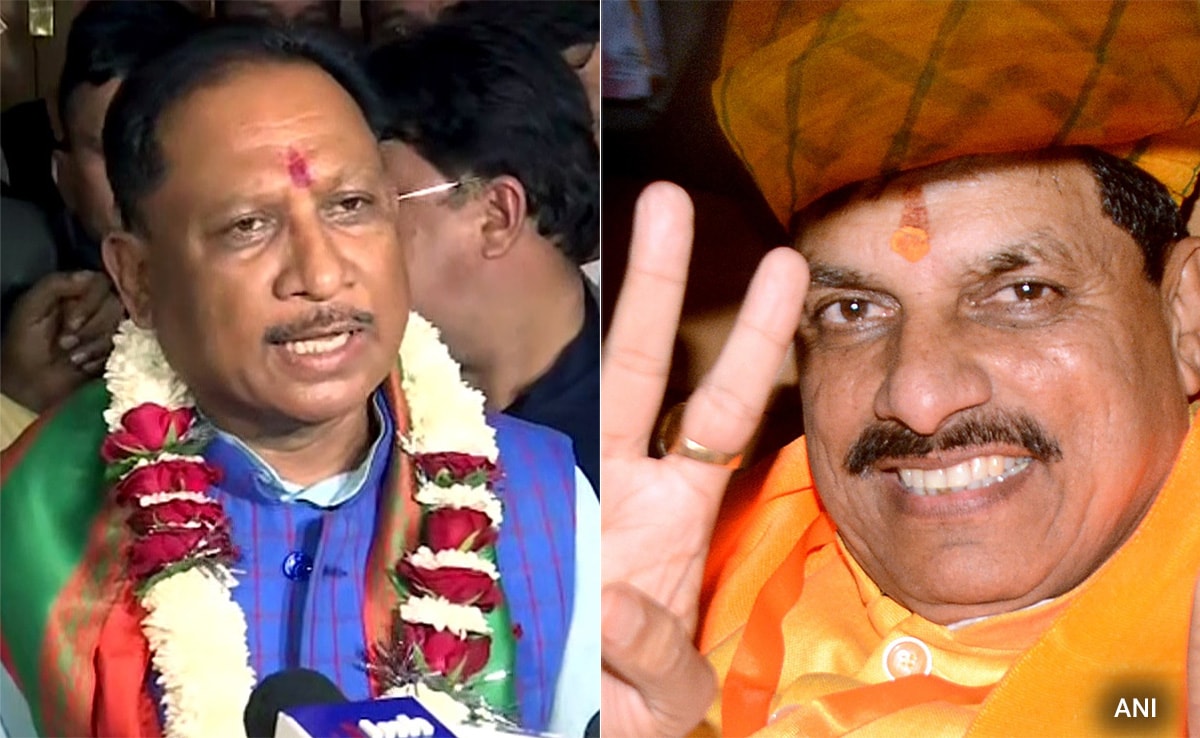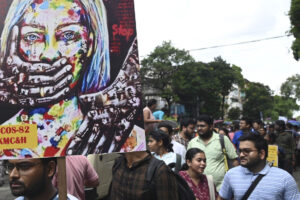
The BJP swept Madhya Pradesh, Rajasthan, and Chhattisgarh in last month’s elections (File).
New Delhi:
After a week of secretive deal-making – and snide swipes from the opposition – the BJP pulled the trigger twice in as many days, naming Vishnu Deo Sai and Mohan Yadav as the new chief ministers of Chhattisgarh and Madhya Pradesh. Both picks were out of left field but have been seen as part of the BJP’s masterplan to balance caste/class ahead of next year’s general election.
For example, in Chhattisgarh – a state where tribal communities form 32 per cent of the population – the BJP has opted for a tribal leader. The party could have also settled on a Chief Minister from an OBC, or Other Backward Class, but a dominant show in tribal-dominated seats made that choice moot.
Over in Madhya Pradesh, the BJP walked a tighter rope and had to factor in two Deputy Chief Ministers, plus the Speaker’s chair, to cobble together a leadership structure that (it hopes) will keep various communities, and their political reps, happy and voting saffron through to the 2024 election.
The heartland state now has a Chief Minister from the Yadav community (an OBC), Dalit (Jagdish Devda) and Brahmin (Rajendra Shukla) faces as his deputies, and a Thakur (ex-Union Minister Narendra Singh Tomar, seen by some as a potential Chief Minister pick too) as the Assembly speaker.
That the BJP, or any party, picks chief ministers or ministers with an eye on electorally-important communities is not new, although some may argue it means some groups, such as non-Hindus and women, get overlooked. What is significant in these picks, though, is the planning that went into naming Mr Sai and Mr Yadav (and his deputies), and will go into selecting a Rajasthan Chief Minister.
READ | The 7 BJP Frontrunners For Rajasthan Chief Minister’s Post
The point is this – in both Chhattisgarh and Madhya Pradesh, the BJP’s choices are a nod not only to state-centric caste/class arithmetic but also to a regional spread of different communities and castes.
Chhattisgarh
Once it emerged the BJP had won 22 of 26 seats in the state’s tribal belt of Surguja and Bastar, the party had little choice but to pick a member of that community as Chief Minister, and so came Mr Sai.
READ | Tribal Leader Vishnu Deo Sai Is New Chhattisgarh Chief Minister
The strong showing itself was not a surprise – Prime Minister Narendra Modi’s sustained outreach in campaigning, including hailing the state’s tribal heritage, declaring himself “born to serve” the community and references to President Droupadi Murmu, went a long way to courting those votes.
For the BJP, though, picking Vishnu Deo Sai as the Chief Minister was more than just acknowledging tribal voters. It was, and is, about prepping a cross-border campaign platform for the 2024 election that will allow the party to tap those votes across several states in one go.
Madhya Pradesh and Jharkhand, two of six states bordering Chhattisgarh, have sizeable tribal numbers – nearly 22 and more than 26 per cent, respectively. In Odisha, another border state and the home state of President Murmu, tribal communities account for over 23 per cent of the population.
Picking Mr Sai as the Chief Minister in Chhattisgarh allows the BJP to project itself as a tribal-friendly face in these states before the 2024 polls. These four combined have 75 Lok Sabha seats, of which 20 are reserved for tribal communities that, in dozens more, are a key vote base.
Madhya Pradesh
Across the border too, the BJP has been assiduously tracking tribal votes; that persistence paid dividends in this election, with the party claiming 24 of 47 Assembly seats reserved for ST candidates.
And the community, less significant within the state’s demographic make-up, has been rewarded with a Deputy Chief Minister in Jagdish Devda. Picking a Brahmin face as the other deputy balances the party’s need to keep upper caste voters in the state, which it has dominated since 2003, happy.
READ | BJP’s Madhya Pradesh Surprise: Mohan Yadav To Be Chief Minister
So, if tribal communities have been paid court so far, the selection of Mr Yadav as the new Madhya Pradesh Chief Minister suggests the BJP is setting its sights on the politically crucial states of Uttar Pradesh and Bihar, which will send a massive 120 MPs to the Lok Sabha next year.
Essentially, if the BJP were to sweep these two states (and assuming it continues to dominate the Hindi heartland), there is realistically little the opposition can do to prevent a third term for Mr Modi.
How might a Yadav as Madhya Pradesh Chief Minister play to this? In the central state, the Yadavs account for only six per cent of the overall population. However, they are the largest OBC group in Bihar (over 14 per cent) and are around 10 per cent of the population in UP, for a total of 30 per cent.
READ | NDTV Explainer: With Eye On Polls, Breaking Down Bihar’s Caste Survey
A Yadav face as the Chief Minister in Madhya Pradesh is a message of empowerment to a community spread across three states that send a combined 149 MPs to Parliament.
It has also been seen as a swipe at Yadavs in the opposition – the Samajwadi Party’s Akhilesh Yadav in UP and the Rashtriya Janata Dal’s Tejashwi Yadav in Bihar.
Rajasthan
This leaves Rajasthan – of the three states the BJP won last month – as the only one without a new Chief Minister or government. The BJP is widely expected to resolve that by this evening, with the focus, as in Madhya Pradesh or Chhattisgarh, on maximising potential gains before the 2024 election.
The obvious pick here is stalwart Vasundhara Raje – a scion of the Scindia royal family, she is a two-time Chief Minister, has enormous sway over local BJP leaders, and is well-liked by the public.
But given the party shunned the obvious in Madhya Pradesh and Chhattisgarh, saying ‘no’ to Shivraj Singh Chouhan and Raman Singh, the expectation is there will be a new face here too.
READ | Another Surprise? BJP May Announce Rajasthan Chief Minister Today
Several big names, including Ms Raje and Union Law Minister Arjun Ram Meghwal, are in the running, but the arithmetic here suggests two major criteria – upper class, or Rajput, and a woman.
The latter might be key given the BJP’s recent push to win over women voters.
With those in mind, and the ‘new face’ factor, there is talk that Diya Kumari might get the nod.
READ | Palace To Parliament: Diya Kumari Among Rajasthan Chief Minister Favourites
A member of the former Jaipur royal family, she has the political nous, having won three elections now, and is liked by the people, particularly for blending her royal heritage with a ‘down-to-earth’ persona.
NDTV is now available on WhatsApp channels. Click on the link to get all the latest updates from NDTV on your chat.




